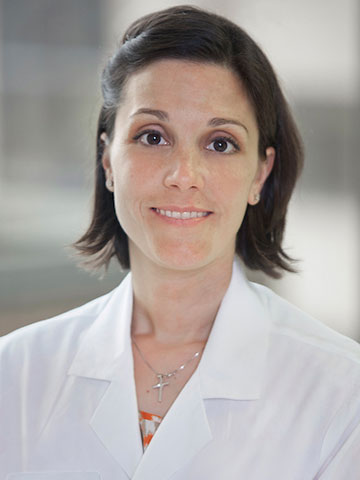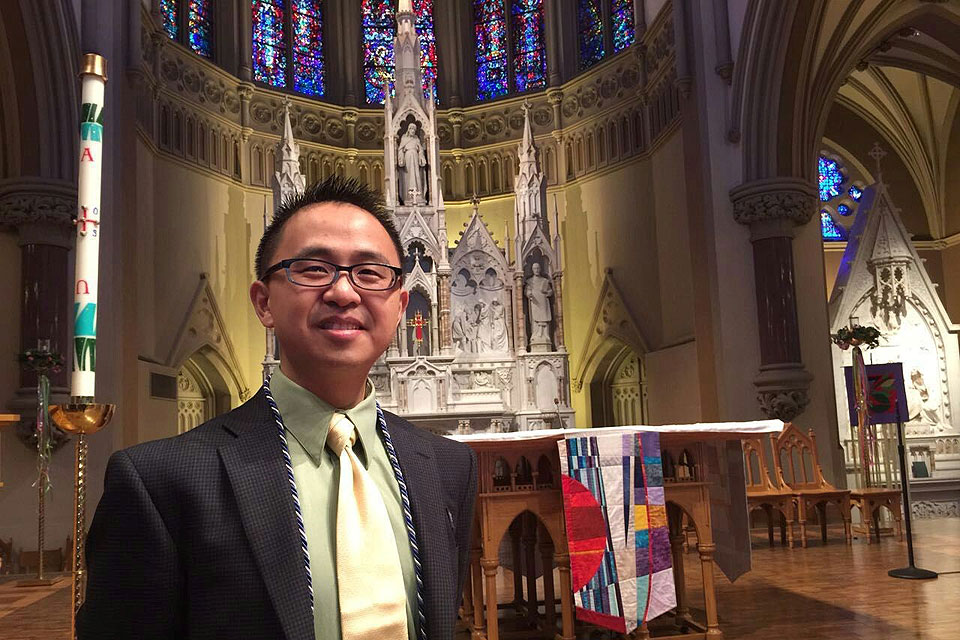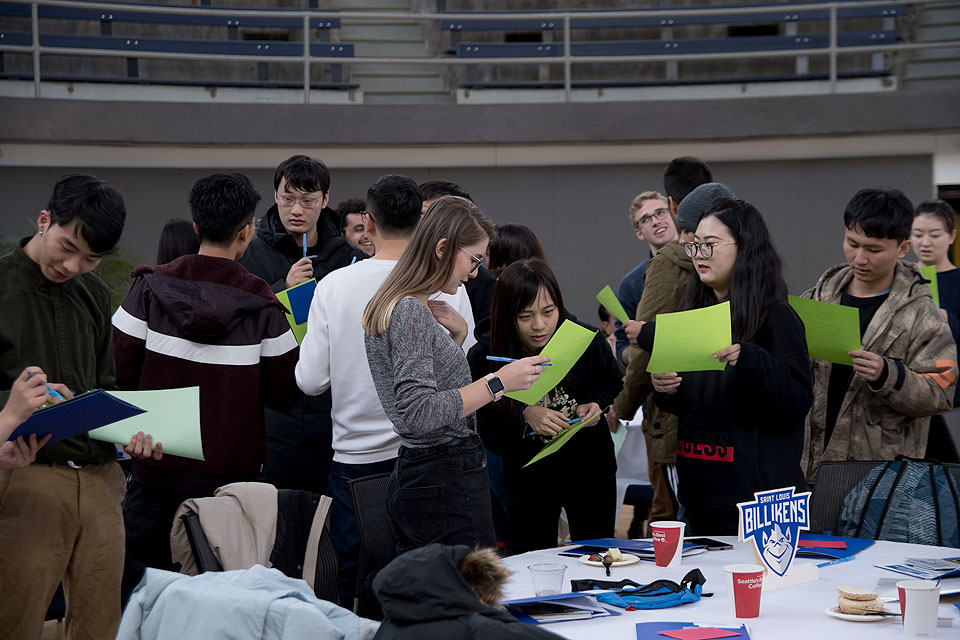January Professional Notes
A round-up of awards, presentations, papers and the other professional achievements of SLU faculty, staff and students.
FACULTY AND STAFF
Public Service
The Puerto Rico Forensic Science Project is a joint effort between the National Association of Attorneys General (NAAG), the American Society of Crime Laboratory Directors (ASCLD) and Puerto Rico’s Department of Public Safety to help the island recover from the damage of Hurricane Maria.

Per NAAG, the project has included two needs assessment trips in 2018; an ASCLD Leadership Academy in 2019; and additional work over the past 10 months by forensic scientists and attorneys to assist Puerto Rico’s Bureau of Forensic Science (BFS). MariaTeresa Tersigni-Tarrant, Ph.D., a forensic anthropologist and associate professor in the Center for Anatomical Science and Education, recently participated in a humanitarian mission to help fellow forensic scientists in Puerto Rico.
Tersigni-Tarrant was one of 13 forensic scientists from the continental United States who worked with their BFS counterparts to evaluate and improve testing methods, and to increase the lab’s capacity and the timeliness of its analyses. The NAAG and ASCLD team also evaluated infrastructure and instrument needs, and assisted state and federal prosecutors and law enforcement officers, as well as BFS personnel, in developing prioritization plans for evidence testing by the BFS that reflect the public safety needs of Puerto Rico.
Appointments
Denise Johnson, director of planning and operations for the School of Medicine, has been appointed to the American Association of Medical Colleges (AAMC) to serve as the national chair-elect of the association’s Group on Institutional Planning (GIP) Steering Committee. The committee helps determine the GIP’s representation at the AAMC Leadership Forum, assists with conference planning and develops programming that aligns with AAMC priorities. Johnson will serve a one-year term and was a past member-at-large of the steering committee.
Tony DeCesare, Ph.D., assistant professor in the School of Education, has been named the United States Coordinator for the newly forming North American Network of the Human Development and Capabilities Association (HDCA). The HDCA is a global network of academics and practitioners that seeks to build an intellectual community around the ideas of human development and the capability approach and to relate these ideas to the policy arena. The North American Network of the HDCA is composed of scholars and practitioners from the U.S., Canada, and Mexico whose work aims to promote human development, well-being, and social justice.
Awards and Fellowships
Jeffrey Bishop, M.D., Ph.D., Tenet Endowed Chair of Health Care Ethics in the Albert Gnaegi Center for Health Care Ethics, was granted two visiting fellowship awards with the Faculty of Divinity and in Clare Hall at Cambridge University in the United Kingdom.
The Master of Health Administration (MHA) Program in the College for Public Health and Social Justice has been tapped as the 2018 AUPHA Program of the Year by the Association of University Programs in Health Administration (AUPHA). The award recognizes SLU’s MHA program for its accomplishments during 2018 including for the amount of faculty and program activities and news submitted to the association; publication in the Journal of Health Education Administration; leadership preparation activities; and presentations given.
Publications
A Social and Cultural History of Late Antiquity by Douglas Boin, Ph.D., of the Department of History, College of Arts and Sciences, has been named as one of four finalists in the Classics category of the Association of American Publishers’ PROSE Awards competition. Boin’s monograph was published by Wiley in 2017.
Faculty members in the College for Public Health and Social Justice Master of Health Administration (MHA) Program provided underwriting support to the Commission on Accreditation of Healthcare Management Education (CAHME) on their white paper, "Getting to 100: Preparing Healthcare Leaders for the Next 50 Years."
"Getting to 100" provides insight to programs, faculty, healthcare professionals, and students on how to project and meet the healthcare needs of the future. The white paper is accompanied by a video series featuring excerpts from various health care leaders.
The document provides an introduction by Anthony Stanowski, the president and CEO of CAHME; insight from six health care leaders from across the country; and a concluding statement from Steven Howard, Ph.D., director of the MHA/EMHA programs at SLU.
Michael Counte, Ph.D., professor, and Steven Howard, Ph.D., associate professor and director of the Master of Health Administration and Executive Master of Health Administration Programs in the College for Public Health and Social Justice co-authored “Global Advances in Value-Based Payment and Their Implications for Global Health Management Education, Development, and Practice,” a paper published in Frontiers in Public Health. The paper describes the globally acknowledged need for incentive-based organizational performance and relevant implications for health care management education and practice. It also outlines the major rationale underlying Value-Based Payment or Pay for Performance health policy initiatives and their basic elements.
Additional co-authors include Larry Chang, Ph.D., of Taipei Beitou Hospital; and William Aaronson, Ph.D., chair, Department of Health Services Administration and Policy, Temple University.
A study by Darcell Scharff, Ph.D., and Ellen Barnidge, Ph.D., of the Department of Behavioral Science and Health Education in the College for Public Health and Social Justice, found that when programs provide the resources necessary to enable participants to develop leadership skills, they may discover empowerment opportunities in even the most disadvantaged situations. The study was published in Maternal and Child Health Journal.
Racial disparities in birth outcomes are a significant problem in the U.S. To address disparities in the St. Louis area, the federally funded St. Louis Healthy Start (SLHS) program works to reduce individual and social causes of infant mortality. The required components of Healthy Start programs include core services and core systems-building efforts.
SLHS recruited women from three zip codes in St. Louis City and County with high infant mortality rates, high rates of low birth weight, and low rates of adequate prenatal care, to participate in the program. Staff observed that many SLHS participants exhibited various skills, such as advocating for their families to improve conditions in the community and that could help them effectively navigate and survive in their communities. As a result of these observations, SLHS created the Making Change Happen Leadership Academy (MCHLA).
MCHLA empowers women by providing tools to identify their neighborhood’s needs and assets and for building skills to find solutions. Women develop skills in leading meetings, planning agendas, and incorporating core skills needed to act on issues. MCHLA prepares women to engage in community collaboration, information sharing, and advocacy. All SLHS participants and HSAC members (recruited primarily through word of mouth) were eligible to join MCHLA.
Four primary themes emerged from the coded data and reflect the impact of the MCHLA on the leadership abilities of participants: (1) development of new skills, (2) development of new attitudes, (3) the importance of social support, and (4) the importance of using their voice.
Participants reported developing new parenting, professional, and advocacy skills. They also developed new attitudes, such as feeling empowered and gaining confidence.
Co-researchers include Scharff, Barnidge, Keri Jupka, of Emerson YMCA, Lora Gulley and Kate Kasper, Generate Health.
Doisy College of Health Sciences recently released the new issue of its college magazine, On the Record.
Workshops, Presentations and Lectures
This semester, the Center for Service and Community Engagement and the Cross Cultural Center launched a workshop series to further their mission of moving from cultural competency to cultural. The Social Justice and Advocacy Series, a six-part series will allow participants to explore the following topics:
- Jan. 18, “Conceptualizing Social Justice”
- Feb. 1, “Privilege & Power”
- Feb. 8, “Conflict & Social Justice”
- Feb. 15, “Social Change Methods”
- March 1, “Political Process & Policy”
- March 22, “Effective Messaging & Framing”
For those interested in contributing as facilitators during the workshops’ next round, contact Jessica Trout, Ben Smyth or Charles Martin.
STUDENTS
Studies and Publications
Zidong Zhang, a doctoral student in the College for Public Health and Social Justice, and SLUCare physician Krista Lentine, M.D., have published a study examining the use of metformin after kidney transplants received by diabetic organ recipients. Their results, published in Clinical Transplantation, found that use of the drug was associated with a lower risk of death, particularly death due to major infection events.
The study found that among 14,144 recipients with pre-transplant type 2 diabetes mellitus, metformin use in the first year after transplantation was associated with lower odds of all-cause and infection-specific death by 56 percent and 68 percent, respectively. The study also found that most of the kidney recipients who filled metformin after transplantation received co-medications to control diabetes.
“Metformin is less frequently prescribed after kidney transplantation due to concerns for use in patients with reduced kidney function and less experience in the transplant population,” Lentine said. “Although our observational study might be limited in distinguishing the benefits of metformin from the beneficial effects mediated by metformin, we believe the more important message from this study is that patients who received metformin did not have patterns of increased harm.”
The study found that 92 percent of kidney transplant recipients on metformin after transplantation had been administered with other anti-diabetic medications, according to Zhang, the study’s biostatistician. The primary types of co-medications were sulfonylurea (49 percent), glitazones (12 percent), and insulin (77 percent).
Among metformin users, outcomes did not differ significantly according to whether metformin was received alone or with other agents.
Experiential Learning
Twenty-one graduate students, ten students seeking master’s degrees and eleven doctoral students, competed in a Three Minute Thesis (3MT) competition on Nov. 30, 2018.
The unique competition, developed by the University of Queensland, requires presenters to explain their research using language the general public would comprehend in three minutes. The competitors were allowed to use a single PowerPoint slide without any other resources during their presentation.
The SLU pitch contest winners were:
Doctoral
- Alec Arnold, Theology and Health Care Ethics, “The Technologization of Desire and the Ethics of Ecstasy: Transhumanist Sexuality in Light of Karol Wojtyla/John Paul II's Personalist Philosophy and Theology of the Body.” Arnold took home first place, $750 and registration to the annual Midwestern Association of Graduate Schools meeting in Saint Louis to compete in the regional 3MT competition.
- Amanda Eccardt, Biology, “A Metalloporphryin That Serves as a Peroxidase and Insulin Mimetic in Skeletal Muscle.” Eccardt won second place and $500.
- James McGuire, Philosophy, “The Practice and Virtue of Community,” received third place and $250.
Masters
- Mohamed Talovic, Biomedical Engineering, “Decellularized extracellular matrix gelloids for the delivery of mesenchymal stem cells for muscle regeneration,” received first place and $750.
- Hannah Fitterman-Harris, Clinical Psychology, “Weight Bias Reduction Among First-Year Medical Students: A Randomized, Controlled Trial,” won second place and $500.
- Abigail Brown, Biology, “Effect of Glutathione Synthesis for Group B Streptococcus Infection of Mammalian Macrophage Cells,” took home third place and $250.
Judges included Lauren Landfried, Ph.D., Nutrition and Dietetics; Jim Edwards, Ph.D., Chemistry; Jenna Gorlewicz, Ph.D., Mechanical Engineering; Whitney Linsenmeyer, Ph.D., Nutrition and Dietetics; Atria Larson, Ph.D., Theological Studies; Ricardo Wray, Ph.D., Behavioral Science and Health Education; Laurie Shornick, Ph.D., Biology; Toby Benis, Ph.D., English; and Steven Sanchez, Ph.D., Academic Affairs.
Students from 19 different countries arrived at SLU in January, becoming the University’s newest Billikens. The Office of International Services, INTO SLU and the International Student Ambassadors welcomed the students and helped them prepare for the start of semester. Learn more about getting involved with the University’s Host Family Program and the International Student Ambassadors here.



















